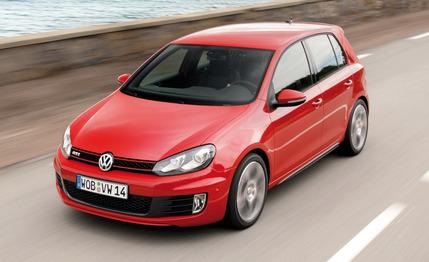 First Drive Review
First Drive Review
We don't think we're sucking up too much if we state that Volkswagen's GTI is the only true icon among compact hatchbacks. It's been around for 33 years now, and every generation of the Golf has worn the GTI moniker since it first debuted in 1976 as an unlikely engineering project.
The GTI began life as a segment buster. When it was launched, it was intended to entice cool and trendy urban types who wanted to lay waste to far bigger, far more traditional coupes and family sedans. The GTI did just that, and it was a sensation. The car wasn't cheap, but it was well executed and an absolute blast to drive. Whether you lived in Paris, Hamburg, or Milan, you had to have a black GTI. The last-generation GTI was a favorite in our offices, winning three straight 10Best Cars awards.
The recipe hasn't changed much, and VW hopes neither have customer preferences. The new, sixth-generation GTI is based on the Golf (the Rabbit moniker is finally dead, according to Jochen Sengpiehl, executive director of Volkswagen marketing), and it offers a welcome 50-hp premium over the 160-hp, 1.4-liter super-and-turbocharged engine that serves as the top option in the European-market Golf.
Familiar Displacement, 10 More Horsepower
The new GTI makes 210 hp at 5300 rpm, produced by a turbocharged direct-injection 2.0-liter four-cylinder engine that is significantly tweaked from its predecessor. In fact, VW now speaks of it as a new engine generation. Maximum torque is 207 lb-ft, available over a wide plateau from 1700 to 5200 rpm. The previous GTI made 200 hp and the same 207 lb-ft, although peak torque occurred over a narrower band from 1800 to 5000 rpm. Unfortunately, only overseas buyers will get to enjoy the new powerplant's added grunt, as the U.S.-market GTI will carry-over the existing 200-hp turbo four for the foreseeable future.
The increase in power translates into impressive street performance. Zero to 62 mph takes 6.9 seconds; top speed is a drag-limited 149 mph. Still, the GTI gets 32 mpg combined in the European cycle, and fuel economy creeping toward 30 mpg is entirely realistic even for passionate drivers.
As the Golf family grows, Europeans might find it increasingly hard to opt for the GTI. Notable alternatives will be an R-badged version of the Golf, possibly dubbed R20 and to be powered by a 270-hp turbo four, and a diesel-powered GTD model with all the styling cues of the GTI. The latter will be powered by a 170-hp turbo-diesel that serves up a whopping 258 lb-ft of torque and can propel the car to 138 mph. In other words, it will run circles around every small hybrid on the market while returning 44 mpg in the European cycle.
New Tech, but the Good Times Carry Over
Technology features include the standard electronic differential, dubbed XDS. In fast corners, it applies slight brake pressure to the inner wheel, which sends more torque to the outer wheels. Understeer is thus subtly reduced, and corner-exit speeds improve. The handling characteristics resemble those of an all-wheel-drive car, says VW, and although the change is noticeable, we won’t go quite that far. Despite its 2900 pounds, the GTI is highly tossable and always eager to go for a romp. If you overdo it, the standard electronic stability control kicks in gently and with enough of a delay to let you keep playing. You can't switch it off entirely, though—get on the brakes, and ESP will reengage.
The GTI has always embraced a happy compromise between sportiness and everyday comfort, leaning a bit toward the firm side. We didn't get a chance to sample a GTI with the standard suspension, but we'd consider skipping the optional DCC adaptive chassis, which offers three settings: default; comfort, which softens things up slightly; and sport, which we liked best because it firms up the steering along with the suspension.